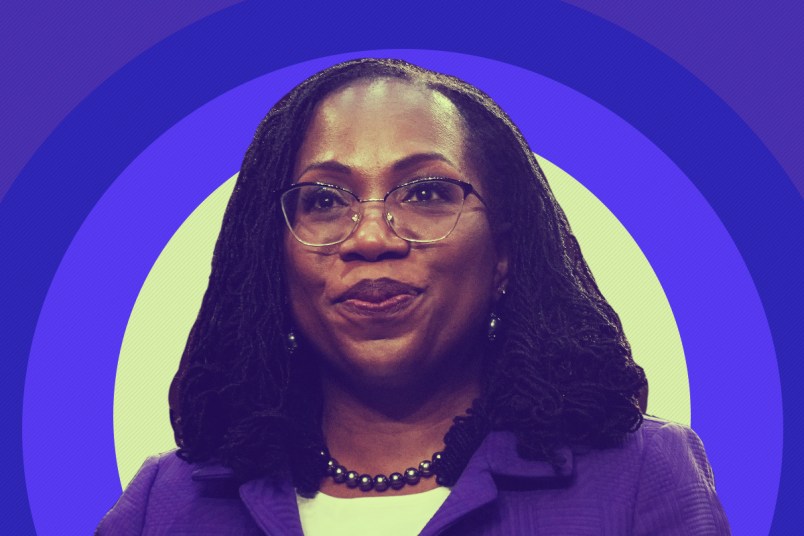Judge became Justice Thursday as the Senate confirmed Ketanji Brown Jackson to a lifetime appointment on the Supreme Court.
Three Republicans — Sens. Susan Collins (R-ME), Lisa Murkowski (R-AK) and Mitt Romney (R-UT) — joined all of the Democrats in voting to confirm her.
It’ll be a moment forever enshrined in American history: she’s the first Black woman to ever serve on the bench, and the first with significant experience representing criminal defendants in decades.
But in the short term, her glass ceiling-shattering victory can look inconsequential. Because she’s filling the seat of the retiring Justice Stephen Breyer, the Court’s political composition remains consistent. Conservatives maintain their whopping 6-3 majority, and appear primed to tear down Roe v. Wade, to unravel gun control regulations, to chip away at environmental protections. During Jackson’s confirmation hearing, Republican politicians encouraged the Court’s conservatives to go even further, urging them to roll back a century of civil rights advancements.
Jackson, along with Justices Elena Kagan and Sonia Sotomayor, will likely be relegated to the minority on such cases. While the conservative majority tramples and steamrolls, they’ll offer up dissents in its wake.
For a newly minted justice, it may be a disheartening assignment. But as history has shown, it’s often an important one, and sometimes one that ultimately changes the shape of American life.
In its early years, standing on shaky authority, the Court discouraged dissents. Justices believed that the Court speaking as one increased its legitimacy and power.
But as the years progressed, the dissent emerged as not only a natural byproduct of tangling with difficult legal questions — it became a hallmark of a healthy democracy, where rigorous disagreement and questioning of the victors is not a threat but a strength.
In some of those dissents, the justices were prescient, speaking not for their current America but for a better one they hoped it would grow to be.
“Our constitution is color-blind, and neither knows nor tolerates classes among citizens. In respect of civil rights, all citizens are equal before the law,” thundered Justice John Marshall Harlan, the sole dissenter in Plessy v. Ferguson, which upheld state-sanctioned segregation.
It would take 58 years for the Court to officially embrace his view in Brown v. Board of Education.
“They sought to protect Americans in their beliefs, their thoughts, their emotions and their sensations,” Justice Louis Brandeis intoned, describing the intention of the Constitution’s framers. “They conferred, as against the government, the right to be let alone the most comprehensive of rights and the right most valued by civilized men.”
His dissent in Olmstead v. United States would form the foundation of the right to privacy that, among other things, protects access to abortion and contraception.
This is what a powerful dissent can do — echo through the decades and undergird progress.
“One purpose of a dissent is to write for the future,” David Cole, national legal director of the ACLU, told TPM. “To set forth a principled argument that, at some future time, might be persuasive enough to galvanize a majority of the justices.”
Dissents of that caliber, writings that change the course of history, are rare. But there’s value in their more garden-variety peers as well. Justices aren’t just writing for posterity; sometimes, they’re writing for the losers.
That’s a role that will only get more important as the Court is poised to threaten rights that, in many cases, the American public overwhelmingly supports and has gotten used to.
“As the Court moves ideologically and the public changes its views, people may receive dissents differently,” Eve Ringsmuth, associate professor of political science at Oklahoma State University, told TPM. “We saw that Justice Ginsburg really struck a chord with some of her dissents, even with regular people and not just Court watchers.”
Jackson may have a particular predilection for this role. Known for her very lengthy opinions on lower courts, she said during her confirmation hearings that she felt duty-bound to explain clearly and in detail why she came down the way she did.
Those kinds of opinions can mobilize people to protest, Congress to act, journalists to scrutinize the majority opinion.
And dissenters also have another role to play completely outside of the public sphere.
When writing their opinions, the justices conference and circulate drafts. In rare cases, the reasoning of the majority or dissenting coalition can sway the justices to change sides. In a more commonplace result, the clashing opinions can tighten up or narrow in scope the arguments on both sides.
The dissenter’s writing, less constrained than the majority’s with its need to keep a five-person group on board, can also be the best glimpse into the mind of the justice that the general public will get.
“It’s a place to get to know them a little bit better,” Ringsmuth said.
Jackson, Kagan and Sotomayor will likely have many opportunities to show the public what they’re thinking. The all-women minority will almost certainly be the voice of the losers as the conservative Court sidles into what could become a period of historic judicial activism.
How Jackson will rule, what issues are most important to her, how much vinegar she’ll sprinkle into her disagreeing opinions is yet to be seen. But we can be certain that there will be one phrase we’ll hear from her before too long.
“I dissent.”







Sometimes we get it right.
Now we need five more just like her.
The Southern Gentleman was not properly dressed?
Vapors!!!
The disrespect from the Republicans surprises even me.
It’s a good day!